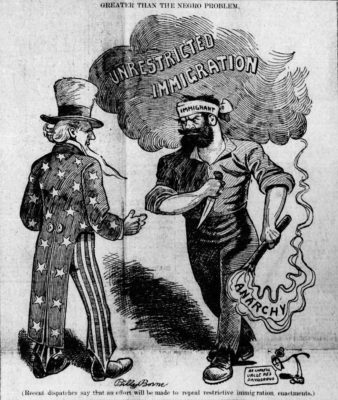Project Showcase: Cartoon Asheville
23 May 2019 – David Dry

This January 16, 1908 cartoon by Willis “Billy” Borne highlights anxieties about the possible loosening of immigration restrictions after the passage of the 1907 Immigration Act. Image credit: North Carolina Room, Pack Memorial Library, Asheville, NC
Many history teachers utilize editorial cartoons as vivid historical sources that succinctly encapsulate a range of viewpoints on a topic. Famous examples include the work of Thomas Nast at Harper’s Weekly and John Tenniel at Punch. The perspectives of editorial cartoonists in major cities such as New York, however, did not always illustrate the viewpoints of other parts of the country. A new project, Cartoon Asheville, helps rectify this imbalance by digitizing the full works of an early-twentieth-century newspaper cartoonist in a small southern Appalachian city.
Cartoon Asheville catalogs the comic art of editorial cartoonist Willis “Billy” Borne, who worked for the Asheville Citizen from 1907 to 1928. We know little about cartoonists who operated in smaller cities across the United States and many of their works have yet to be made available for use by historians and history teachers. Examining their artwork, however, can illuminate local perspectives on national events. Borne, for example, captured the changing mores and political ideologies of the people of western North Carolina.
Averaging 280 cartoons a year over his twenty-year career, Borne composed over 6,000 cartoons, most of which appeared prominently on the front page of the newspaper. Each cartoon has been tagged with between five and fifteen relevant keywords, and with over 6,100 unique keywords included on the website, this new repository allows the cartoons to be searched with precision to locate reactions to specific events or survey broader themes.
Using an Omeka-based platform, the Cartoon Asheville website includes an exhibit, Introducing Borne and His Cartoons, that provides background information for interpreting his work. In addition, a handful of curated collections organize selected cartoons by topic. History teachers will find the collections on Prohibition, women’s suffrage, portrayals of African Americans, and World War I particularly useful as teaching examples or for student assignments. For all of these topics, Borne’s viewpoints change over time, and his editorial perspective stands out from his New York City contemporaries in reflecting the prejudices of his white, southern Appalachian audience.
Borne informed and entertained the people of Asheville for a generation with his humor and artistry. The hope is that Cartoon Asheville will allow a new generation and a broader audience to discover Borne and draw fresh insights from his cartoons. From Borne’s work, we learn that comic art provides a window into the popular attitudes that motivated public discourse in a historical period.
~ David Dry is the creator of Cartoon Asheville. He is a doctoral student at the University of North Carolina at Chapel Hill and a former history instructor at Asheville-Buncombe Technical Community College.



